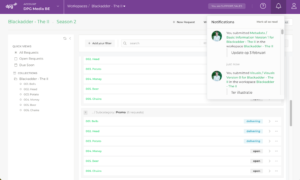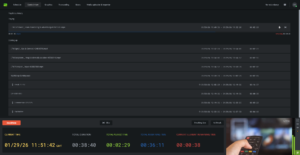
Charlie Day
Global Partner Manager, International Sales Team
Just as many companies have already done with business functions such as accounting, human resources, and IT, there are now very good reasons for outsourcing sales. It affords increased sales through rapid deployment and scalability; better overall risk management; and the ability to refocus existing resources on the core business, all of which result in a substantial increase in profitability.
I’ve been the managing director of a successful broadcast system design, sales, and content delivery firm for more than 25 years and know first-hand that many companies were – and are - looking for ways to make their sales strategy more efficient, pro-active, and productive. The complexity of maintaining in-house sales teams nationally and, particularly, internationally has always been under scrutiny, but until now has been accepted as a necessary cost of doing business.
It needn’t be any longer.
International Sales Team, “IST”, was created to provide highly skilled sales professionals who are strategically located around the globe and immediately available - on the ground - ready to perform for broadcast industry manufacturers and suppliers in key international locations from day one.

The ability to immediately source and deploy high quality sales representatives, pretty much anywhere in the world, who are totally at ease with local business and cultural norms from the start, is a massive advantage to generating new sales quickly. This is because they “speak the language”, not only natively but also in the local business parlance. Moreover, they already have an extensive network of local and regional contacts, ready-made to evaluate and, hopefully, buy your product or service.
Outsourced sales is different from the use of a distributor or agent. Whereas a distributor acts somewhat independently of the manufacturer and decides on sales activity and retail prices etc, with IST, the manufacturer/supplier retains direct contact with, and maintains full visibility of, the outsourced sales company and its representatives, including regular reporting, updated training, feedback on local and regional market trends, and much more.
Given the current travel obstacles and health concerns, a manufacturer stands a far better chance of a local sales representative being able to quickly, and repeatedly call on a customer in their region rather than organising an in-house, international travel and sustenance schedule in the midst of a pandemic.
That’s not to say that you can totally dismantle an in-house sales team. Outsourced sales forces can be used to complement a domestic team to quickly capitalise on emerging markets or periods of opportunity that would take too long to ramp up and exploit via traditional means.
And what is an outsourced salesperson’s incentive? Well, it’s the same as the partners they represent, i.e., to increase profits. The difference with outsourced sales is that the manufacturer is no longer responsible for the additional overheads traditionally associated with achieving that goal. IST is rewarded on sales, so in that respect the interests of the partner and IST are perfectly aligned.
From there the alignment diverges, but in ways that benefit the manufacturing or supply partner. For example, outsourcing sales reduces the need to recruit and/or relocate employees (and often their families) to international locations. There’s no longer any need to wrestle with housing, schools, taxes, local employment law, work visa requirements (which in many regions can be fairly draconian) and binding employment contracts. IST looks after all that.
It’s also important to note that locally sourced sales professionals know how and where to find business opportunities that are often overlooked by in-house sales staff, who sometimes spend too much time chasing big fish while ignoring potentially lucrative niches, new vertical markets, and other, less-travelled tributaries where the net pickings may be smaller but exist in far greater numbers.

Outsourcing is also more cost efficient because the sales professionals sell more than one, complementary, product at a time during each visit. In other words, one call covers the non-competitive interests of multiple manufacturers.
I’ve already mentioned scalability, but it’s worth repeating that if a rich and potentially lucrative market is identified, upscaling to take advantage of it is easy to do with an outsourced sales team, whereas upscaling, and subsequently running an international sales team can be costly, tedious, and risky. If something goes wrong, or performance targets aren’t met, redirecting an international sales force can be similar to turning around the proverbial super tanker. Local sales staff, however, know how and where to find all the potential sales prospects. It’s full steam ahead.
Ultimately, outsourcing sales is yet another way of engaging professionals to perform on partners’ behalf and have them assume the risks the partner would otherwise have to take, right from recruiting sales staff (largely eliminated) and ongoing training (significantly reduced) right through to managing and negotiating the vagaries of wages, local government compliance, and legal contractual obligations. When outsourced, all of this becomes the responsibility of IST, therefore taking the weight off partners’ shoulders.
Supporting an international sales presence can be complicated and financially draining at the best of times, which is what has led many manufacturers, suppliers, and service providers in the broadcast trade to rethink whether there might be a better, and more profitable, alternative to traditional international – or even domestic - sales functions.
Now is the time to consider if outsourcing that function is right for your business.
- Business Models
- Digital Transformation
- Rights & Legal
- Financials, Investment & M&A
- Consumer Habits & Experiences
- Global Markets
- Sales & Marketing
- Coronavirus
- Collaboration
- Sales & Marketing Services
- Digital & Social
- Cloud & Virtualization
- AI/ML, Data & Analytics
- OTT & Streaming Platforms
- Security (e.g. Cyber, Encryption, Conditional Access etc)
- Ad Tech









